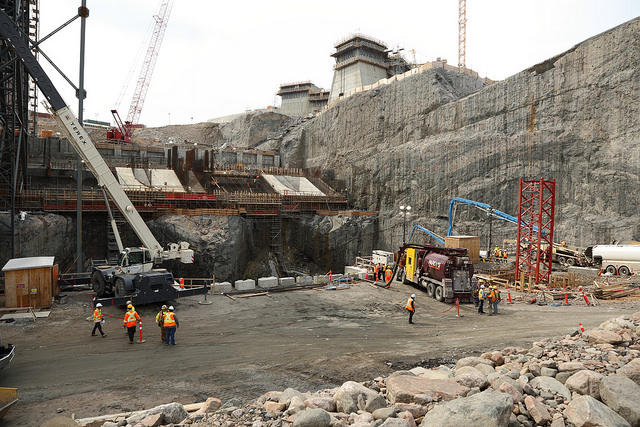Chip in to keep stories like these coming.
The Government of Nunatsiavut is concerned that the thousands of Inuit people who eat fish downstream of the planned Muskrat Falls hydroelectric dam project could be at risk mercury contamination.
The Telegram reports, “The topic was sparked again with the release of a peer-reviewed study, produced by a team out of Harvard University and highlighting methylmercury levels in Lake Melville. The study shows the meeting of salt and fresh water there creates an environment apparently primed to push higher levels of toxic methylmercury into the food chain. …Methylmercury can bioaccumulate and eating fish contaminated with mercury is a main means of human exposure. …The study did not look at mercury levels up through the food chain. That falls to further work now being completed by the Harvard team, with results expected in six months or so.”
The Canadian Press adds, “Hydroelectric projects will put more methylmercury pollution into northern ecosystems than climate change, suggests a new Harvard University study. Methylmercury, a neurotoxin created as mercury blends with bacteria, is linked to heart issues and intellectual problems in children. …The study was mainly funded by the independent National Science Foundation based in North Arlington, Va., with support from the Nunatsiavut government representing Inuit in the Lake Melville region. Its members contacted [Harvard researcher Elsie] Sunderland to help with related research after Muskrat Falls environmental assessments predicted no adverse effects downstream.”
Based on the results of the Harvard paper, it is estimated that methylmercury inputs into Lake Melville could increase by 25 per cent to 200 per cent. But Nalcor, the Crown corporation behind the Muskrat Falls project, claims the methylmercury contamination in Lake Melville will be diluted to “no measurable effects.”
The Telegram notes, “In a Supreme Court of Newfoundland and Labrador decision, on Jan. 12, 2015, Justice David Orsborn rejected Nunatsiavut’s attempt to quash a permit allowing for construction at Muskrat Falls to proceed. In the written ruling, he noted concerns around mercury accumulation remained at the heart of the differences between the two parties. If consumption warnings were ultimately placed on fish species in Lake Melville, they would not be the first for the province.” But consumption warnings problematic for numerous reasons. The nutritional, cultural, social, economic and spiritual value of traditional food consumption for Inuit and other Indigenous groups has been well-documented. There are also major nutritional and other health implications with a shift from traditional country goods to store bought foods. A shift away from country food diets could mean a rise in obesity, diabetes and cardiovascular disease.
The Muskrat Falls hydroelectric dam project includes a 32-metre high north dam and a 29-metre south dam. The Lower Churchill Project would see the construction of two large hydroelectric dams on the Grand River in Labrador, including a dam at Muskrat Falls. Power from Muskrat Falls would be brought to Newfoundland and then to Nova Scotia through a sub-sea link.
Council of Canadians chairperson Maude Barlow has written a nine-point critique of major dams (higher than 15 metres) that highlights major dams often harm Indigenous peoples, are a source of greenhouse gas emissions, and cause mercury poisoning. She writes that pre-conditions for approval include exploration of more environmentally sound alternatives; environmental, accountability to local people who have the right of veto; protection of local food supplies and a guarantee of local health protection. In the report Dam Truths: A compilation of case studies about popular struggles against dams, Blue Planet Project campaigner Meera Karunananthan notes, “the tremendous opposition [to the dam] by the Nunatsiavut Inuit people, the NunatuKavut and Quebec Indigenous groups, as well as environmental organizations like the Sierra Club.”
The Muskrat Falls project is expected to be in operation by 2017.
Photo: Government of Newfoundland and Labrador/flickr
Chip in to keep stories like these coming.




